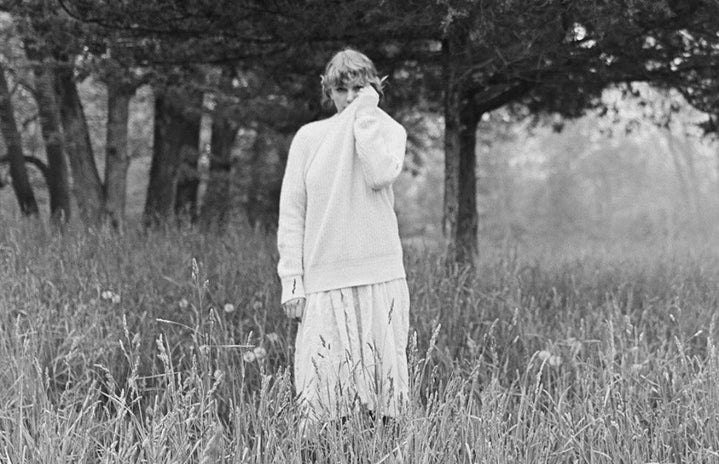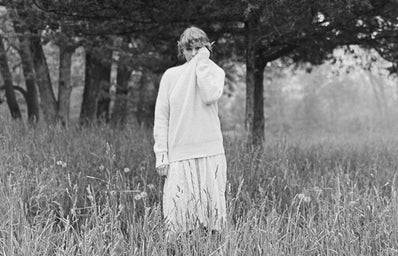I heard a rumor from Inez that not everyone knows about the love triangle surrounding Taylor Swift’s eighth studio album “Folklore.” Even though Inez isn’t always the most reliable of sources, I think we can trust her on this one.
Now before I get too deep into this analysis, let me preface by clarifying something: Inez is not a real person. She’s simply an extremely gossipy character in one of Swift’s best (at least in my opinion), but severely underrated songs “betty” (which, coincidentally, contains a vast amount of importance in the triangle that I’m about to enlighten you on).
During the song, Swift notes that “you can’t believe a word she says,” in reference to Inez, therefore creating the narrative that Inez can be pretty deceitful.
If you’re at all familiar with Swift’s “Folklore,” you’ve most likely heard of the love triangle depicted in the album, even if your knowledge doesn’t extend any further than knowing that this triangle exists. In this article, I’m going to educate you on the basics of the “Folklore” love triangle and hopefully inspire you to give the album another listen.
Swift released “Folklore” on July 24, 2020 and, during a YouTube Q&A about the album, issued a statement saying that there were three songs on the album that she refers to as “The Teenage Love Triangle.” These songs are “cardigan,” “betty” and “august.”
Swift also noted that, “These three songs explore a love triangle from all three people’s perspectives at different times in their lives,” effectively drawing in her audience.
Let’s start by setting the scene. There are three main characters in this story (as love triangles usually go): Betty, James and Augusta/Augustine (she is more commonly known as Augustine so that’s what I’ll be referring to her as).
On to the actual triangle; Betty is James’ girlfriend that breaks up with him after he cheats. James is Betty’s adulterous boyfriend who is trying to get her back, and Augustine is the girl that James cheats on Betty with who ends up falling in love with him.
Each character has a song that is told in his or her perspective. For Betty, it’s “cardigan.” Augustine’s is (you guessed it) “august” and James’ is “betty.”
“cardigan” is told from Betty’s perspective and, in Swift’s words, “is about lost romance and why young love is often fixed so permanently within our memories.”
During “cardigan,” an older Betty is basically mourning the teenage love that she had with James and how he made her feel when they were together.
For Betty, whenever she “felt like an old cardigan,” James would “put me on and say I was your favorite,” creating a sense of comfort and reliability within the relationship.
In “cardigan,” Betty seems distraught over the breakup and conscious of the impact it would leave on her, as she knew that James’ impression would “linger like a tattoo kiss” and “haunt all of my what-ifs.”
The song remarks that, “when you are young people assume you know nothing,” but Betty is certain that she “knew everything” when she was young. She is proven correct by the fact that this song is meant to examine Betty as she reflects back on her relationship with James and she still thinks about him.
Another explicit example of the obvious cheating occuring throughout these songs are the lyrics, “chase two girls, lose the one.”
Betty even predicted that James would come running back after things with Augustine became less exciting, and he discovered the mistake he made, with the words, “I knew you’d come back to me,” which is exactly what is being described in the song from James’ perspective, “betty.”
Augustine, also known as the other woman, expresses her sorrows over her fleeting summer with someone that didn’t belong to her in “august.”
In “august,” Augustine looks back at her summer spent with James, who she fell into a forbidden love with, even though she knows that James was never hers. She reminscies how that August had been “sipped away like a bottle of wine” because James was only with her for a summer fling.
Augustine addresses this song to James by saying “you weren’t mine to lose” and “I remember thinkin’ I had you.”
Unfortunately for Augustine, who asks “will you call when you’re back at school?” us listeners know that after the summer, James will be too busy trying to make it up to Betty to pay any attention to Augustine.
Augustine became so enamoured with James that she would “cancel plans just in case you’d call” and was living “for the hope of it all” that they might somehow stay together.
Augustine also refers to her and James’ relationship as “summer love,” making “august” listeners feel quite bad for Augustine and her situation and empathizing with her over her unrequited love.
Finally, “betty” summarizes 17-year-old James’ confession of cheating and his lamentation about knowing that what he did was wrong as well as trying to win Betty back. The song tells a story of teenage angst in very “Taylor Swift” fashion.
The backstory highlighted in the song goes a little something like this: James saw Betty dancing with another boy in the gym during a school dance (which is where he points out that he knows it’s “where it all went wrong”).
It can be inferred that James became jealous due to this and decided to cheat on Betty as James admits that “the worst thing that I ever did was what I did to you,” strongly implying that adultery had taken place.
Eventually, Betty learns from Inez of James’ philandering and switches her homeroom. However, James realizes that he messed up and tells Betty that his time spent with Augustine was “just a summer thing.”
The lyrics strongly imply connections to the other songs with phrases such as “standin’ in your cardigan” and “I dreamt of you (Betty) all summer long.”
Although a lot of the song is based on storytelling, the main refrain of the song takes place in the present, with James questioning what Betty would do if he “just showed up to her party” and if she would take him back. The eighth and ninth verses of the song depict James on Betty’s doorstep at her party, about to beg her to take him back.
Although, in my opinion, I don’t believe that Betty did take James back after what he put her through (but maybe that’s just wishful thinking).
There you have it. That about sums up the “Folklore” love triangle. However, even though you’re now familiar with one segment of Swift’s deep and meaningful lyricism, beware that there are many other fan theories in “Folklore” that are waiting to be uncovered.


